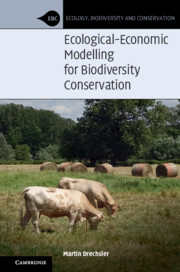Book contents
- Ecological-Economic Modelling for Biodiversity Conservation
- Ecology, Biodiversity and Conservation
- Ecological-Economic Modelling for Biodiversity Conservation
- Copyright page
- Contents
- Preface
- Acknowledgements
- Part I Modelling
- Part II Ecological Modelling
- Part III Economic Modelling
- Part IV Ecological-Economic Modelling
- 14 Foundations of Ecological-Economic Modelling
- 15 Benefits and Challenges of Ecological-Economic Modelling
- 16 Integration of Ecological and Economic Models
- 17 Examples of Ecological-Economic Modelling
- 18 Outlook
- References
- Index
15 - Benefits and Challenges of Ecological-Economic Modelling
from Part IV - Ecological-Economic Modelling
Published online by Cambridge University Press: 29 February 2020
- Ecological-Economic Modelling for Biodiversity Conservation
- Ecology, Biodiversity and Conservation
- Ecological-Economic Modelling for Biodiversity Conservation
- Copyright page
- Contents
- Preface
- Acknowledgements
- Part I Modelling
- Part II Ecological Modelling
- Part III Economic Modelling
- Part IV Ecological-Economic Modelling
- 14 Foundations of Ecological-Economic Modelling
- 15 Benefits and Challenges of Ecological-Economic Modelling
- 16 Integration of Ecological and Economic Models
- 17 Examples of Ecological-Economic Modelling
- 18 Outlook
- References
- Index
Summary
Ecological-economic modelling has advantages but also involves some challenges. Two advantages are presented: the incompatibility of disciplinary solutions which prevents the derivation of good integrated ecological-economic policies and strategies from purely disciplinary research results and feedback loops so that the ecological system component affects the economic one and vice versa. The relevance of these two issues is demonstrated in examples from the literature. A challenge to ecoological-economic modelling is that ecological and economic models often differ in their purposes and features, such as the consideration of uncertainty and spatial structure. The discussion is supported by a literature review on ecological, economic and ecological-economic models. Despite differences between the disciplines’ modelling approaches, ecology and economics share a number of concepts that facilitate integrated modelling, concepts which are outlined in the final section of the chapter.
- Type
- Chapter
- Information
- Ecological-Economic Modelling for Biodiversity Conservation , pp. 206 - 218Publisher: Cambridge University PressPrint publication year: 2020

